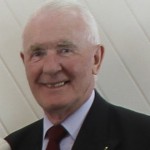Cricket has lost another major figure with the news of the death of former Kent captain and Club President Mike Denness.
A legend of Kent and the only Scotsman to have captained England, Denness passed away after a lengthy but courageous fight against cancer. He was 72.
In the last week of his year as Kent president, and less than four months after being awarded an OBE in the New Year’s Honours List at the start of 2013, his passing has ended a cricketing life chock-full of high achievement, all accomplished with the style and flair he showed with the bat. Yet under a tough and often uncompromising exterior, as a player and in his wider life, lay a sensitive man. His OBE was for services to sport, and he indeed served the game he loved with distinction and care.
Kent supporters will remember him most for the six domestic trophies he secured as captain between 1972 and 1976 – the John Player League three times, the Benson and Hedges Cup twice, and the Gillette Cup in 1974 – for his 17,047 first-class runs he scored (of the 25,886 first class runs he scored in his career) and another 4,001 in one-day cricket, and for his enduring, telepathic and wonderfully complementary partnership at the top of Kent’s batting order in both forms of the game with Brian Luckhurst. How ironic, and sad, that Luckhurst, eight years ago, and now Denness should succumb to cancer while in office as Kent president – an honour they both held very dear.
When appointed OBE, Denness said earlier this year: “I never expected this and it really is a great honour. This completes a thrilling year, during which I have served as Kent Cricket president. It really has been outstanding, and there is so much commitment from everybody. I thoroughly enjoyed Canterbury Week, and all that it involved, and I will treasure the memories for the rest of my life.”
In truth, Denness was not in the best of health during Kent’s annual celebration of the oldest cricket festival in the world last August, but you would never have known it. Typically, he just gritted his teeth and got on with the job of hosting, speaking, meeting and greeting, and he loved every minute of it.
It will now, sadly, be the last memory many Kent cricket followers will have of a man who was one of the central figures, as player and captain, to the golden era of success between 1967 and the late 1970s. He may have left to join Essex in 1977, playing a significant role in their winning of two competitions in 1979, the second of his three seasons at Chelmsford, but he was always a man of Kent (or is that Kentish Man?) in his heart from the moment he joined the club on a special registration in 1962 after impressing in a one-month trial in 1961, on the invitation of Les Ames and following the recommendation of former Kent all-rounder Jim Allan, who played alongside the young Denness for Scotland.
He may have led England in 19 of his 28 Tests but Denness was equally proud of becoming, in 1959, the first schoolboy to be capped by Scotland. It was at Ayr Cricket Club, from the age of eight, that he learned the game under the tutelage of the club’s coach, the former Sussex player Charlie Oakes, having moved to the West of Scotland town as a seven-year-old from Bellshill, near Glasgow in Lanarkshire, where he was born on December 1, 1940.
Denness made only 0 and 3 on his Kent debut in 1962, against Essex, when Jim Laker took full advantage of a turning pitch, but in 1963 he topped a thousand first-class runs in the season for what was to prove to be only the first of fourteen such occasions as a Kent batsman. Especially fluent through the offside, off both the front and back foot, he was quick to advance to the spinners and was equally light on his toes in the covers, where his fielding was a constant source of inspiration to the Kent teams of his era.
It was only against high pace that Denness struggled for dominance at the crease, and indeed his agonies against Dennis Lillee and Jeff Thomson in the Ashes series of 1974-75 in Australia was the start of his downfall as England captain.
He won his first Test cap in August 1969, against New Zealand at the Oval, was vice-captain under Tony Lewis in India in 1972-73 and initially enjoyed some successes when appointed to succeed Ray Illingworth as England’s regular captain for the hard-fought 1973-74 series in the West Indies, which was drawn 1-1, and the subsequent home series in 1974 against India and Pakistan. When England reached Australia that autumn, however, Denness – like several other batsmen in England’s line-up – simply could not impose himself on Lillee and Thomson.
Indeed, after scoring just 65 runs in his first six innings of the series, Denness took the dramatic but brave step of dropping himself for what he felt was the good of the team. Later, he wrote about his decision and the reason for it: “Lillee and Thomson were in the ascendancy all the time. It was very difficult to get runs. You got maybe two balls an over from which you could try to score. There were players who said they would wear them down; Tony Greig said he was just going to get out of line in order to under-cut the ball. None of which really worked.
“After watching John Edrich lead England out for the fourth Test of that series, in Sydney, it is difficult to describe how I felt. It was probably a mixed feeling of despair, sadness and frustration. If I had had my leg in plaster, or my arm in a sling, it would have been different. But I was fully fit.”
When Edrich had a rib broken by Lillee, in another heavy defeat which meant Australia had regained the Ashes, the stoic Denness felt he had to return, and he top-scored with 51 in England’s first innings of the fifth Test. Then, in the final Test of the series, at Melbourne, Denness scored an epic 188 – then the highest score made by an England captain in Australia – after Thomson had withdrawn from the game with injury and Lillee had broken down after bowling a mere six overs. In two Tests in New Zealand, which immediately followed, Denness hit another 181 not out and 59 to illustrate once more not just his personal character and resilience but also his ability to flourish at the highest level against any bowling save genuine pace.
Back home for the 1975 summer, he first led England in the second World Cup – a competition they exited at the semi-final stage, against Australia in a low-scoring affair at Headingley – before being appointed for only the first Test of the subsequent four-match Ashes series. Winning the toss under leaden skies, Denness made the fateful decision to bowl, seeing Australia amass 359 before skittling England twice on a pitch that became rain-affected to win by an innings. Ever the realist, Denness suggested a change might be made to the leadership of the team, and the selectors agreed. He was relieved of the job, and never played for England again.
Denness’s years of achievement in cricket were far from over, however, as he continued to find success as Kent captain and, after his swansong at Essex and retirement as a player in 1980, and a spell as Essex second XI coach from 1981 to 1984, he worked – among other jobs outside the game in finance and insurance – for cricket sponsors as a public relations manager before, from March 1996 until February 2002, acting as an ICC match referee in 14 Tests and 35 ODIs.
Controversy touched his cricket life again in Port Elizabeth in the autumn of 2001 when, in his role as ICC referee in a Test series between South Africa and India, he took a principled stand against what he and the umpires had perceived to be unlawful actions by six Indian players. Five players were cited for over-appealing, and Sachin Tendulkar also received a suspended sanction and fine from Denness for not informing the umpires, while bowling, that he was cleaning the ball using his fingers and thumb in an action which television cameras picked up as being an alleged instance of ball-tampering. The aftermath was outrage in India, and a major political incident, and when India and South Africa refused to have Denness as the match referee for the next scheduled Test, at Centurion, the ICC stood by him and declared that the game would be unofficial.
Returning to Kent for a spell as chairman of the county’s cricket committee, Denness continued to exert influence and he also offered wisdom and judgement as a long-serving pitch liaison officer for the England and Wales Cricket Board. His rich portfolio of cricketing achievement, which includes being named as a Wisden Cricketer of the Year in 1975 and becoming an honorary member of MCC, was indeed complete when he was appointed as Kent’s president and awarded his OBE in what proved to be the last year of his life. “The award to Mike Denness is a fitting recognition for a long and distinguished career in cricket which has seen him fulfil a variety of key roles,” said David Collier, the ECB chief executive, at the start of this year.
Commenting, Mike’s close friend, and Kent Cricket President for 2013, Bob ‘the cat’ Bevan MBE said; “Michael Henry Denness was the finest cricketer ever born in Scotland by a considerable distance. Both on and off the field he epitomised the cricketing term “playing a straight bat”. He was a man of the utmost honesty and integrity. The cricketing counties of Kent and Essex, the whole world of cricket and my wife and I, personally, have lost one of our greatest friends.”
George Kennedy CBE, Chairman of Kent County Cricket Club leads tributes; “This is an extremely sad day for the Club. We have lost one of our great players, a very successful captain and a good friend. It is particularly sad that this has happened during his year as President – a period when the Club had two Scotsman at the helm. Our thoughts are with Mike’s family and friends at this time.”
Jamie Clifford, Kent Cricket CEO; “Mike will be much missed by the world of cricket. He was involved in every aspect of the game and his playing record speaks for itself. It was a great privilege to spend time with Mike during his year as Kent President. He was a valuable sounding board on all subjects – players and captaincy, pitch preparation and quality, cricket administration and politics. My thoughts, and those of all the Kent staff, are with Doreen and Mike’s family at this very sad time.”
Matthew Fleming, former Kent captain; “Mike Denness was one of the very first people to offer his congratulations when I had the privilege of being appointed as Kent’s captain, and he made it clear to me that he was there to help in any way he could. In subsequent years he and Colin Cowdrey were the two people I turned to the most for reassurance and advice. Mike was a natural source of sound, balanced advice.
“While I never saw him play, to me Mike represented so much that is great about Kent Cricket and its history and its place in the game. There are so many great men of cricket who have represented Kent: Colin Cowdrey, Les Ames, Derek Underwood, Brian Luckhurst, John Shepherd to name just a few, and Mike Denness stands alongside the likes of those men in terms of the true greats of Kent cricket history.
“Mike was part of the fabric of Kent Cricket, despite being a Scotsman, and as someone with Scottish blood too I would have no hesitation in saying that the game of cricket in general has lost a very significant figure.”
Mike Gatting, former England captain; “I got to know Mike very well in more recent years through our work together for the Lord’s Taverners, having played against him during my younger days as a player. He was a wonderful batsman but it is as a man that I will best remember him. He was very much a Lord’s Taverners supporter and he was a gentleman. He loved cricket and he played it straight.
“Of course, in his playing career, he was very much part of a magnificent Kent side. They were very strong in his time, and especially under his captaincy when they seemed to have about half the England team of the time playing for them. That’s why, I imagine, he became a leading candidate to captain England but it is his record at Kent which will be remembered. Kent had enormous crowds in those days, who revelled in their success, and it was truly a golden era for the county.”
Niall O’Brien, former Kent cricketer; “Please pass on my condolances to the Denness family. Just heard the news. He was always very supportive of me and someone whom I enjoyed speakaing to about the game.”
David Fulton, former Kent captain; “I was so sad to hear the terrible news of Mike’s passing. He served Kent County Cricket Club as player, captain, chairman of cricket and president, and he was a rock of support for me during my time at Kent both as a player and especially during my captaincy.
“He was a man of compassion and integrity, who was much loved by all of us who worked with him. I hope Kent fans will take some solace from the fact that Kent’s most famous opening partnership of Luckhurst and Denness are united once more. My thoughts and prayers are with Doreen and the family.”
John Stephenson, MCC Assistant Secretary and former England batsman; “Personally, I am very sad at this news as Mike was my Second XI coach when I first joined Essex in the early 1980s. I have some very good memories of those early years in the game, and he was a constant source of wise counsel. We have stayed in touch ever since, and he was a lovely man.
“As far as MCC is concerned, Mike Denness was a life member and a greatly valued member of the club. He also sat on the MCC cricket committee for a number of years and served the club well in many ways. He was a great friend of the club, but over and above that he was a great servant to English (and Scottish) cricket as a fine batsman and as an England captain. He was a playing hero of many of us who were growing up in the late 1960s and 1970s.”
ECB Chief Executive David Collier added: “Mike was a man who gave so much to our game in so many different ways as a player, captain, match referee and administrator. I had the honour of working with Mike in my first role in cricket administration at Essex and Mike was a wonderful source of advice and knowledge. He will be sorely missed by all – especially by everyone at Kent.
“All at ECB were delighted to see him receive national recognition for his service to cricket in the recent New Year’s Honours list and we send our condolences today to his partner Doreen, immediate family and all his many friends within the First Class game.”
MICHAEL HENRY DENNESS – CAREER RECORD
For England:
28 Tests (1969-1975): Inns 45, NO 3, Runs 1667, Average 39.69, 4×100
12 ODIs (1973-1975): Inns 11, NO 2, Runs 264, Average 29.33
For Kent (1962-1976):
First-class: Matches 333, Inns 562, NO 44, Runs 17,047, Average 32.90, 21×100
List A one-day games: Matches 158, Inns 150, NO 17, Runs 4,001, Average 30.08, 5×100
Overall first-class (1962-1980):
Matches 501, Inns 838, NO 65, Runs 25,886, Average 33.48, 33×100
Overall List A (1963-1980):
Matches 232, Inns 219, NO 21, Runs 5,393, Average 27.23, 6×100





